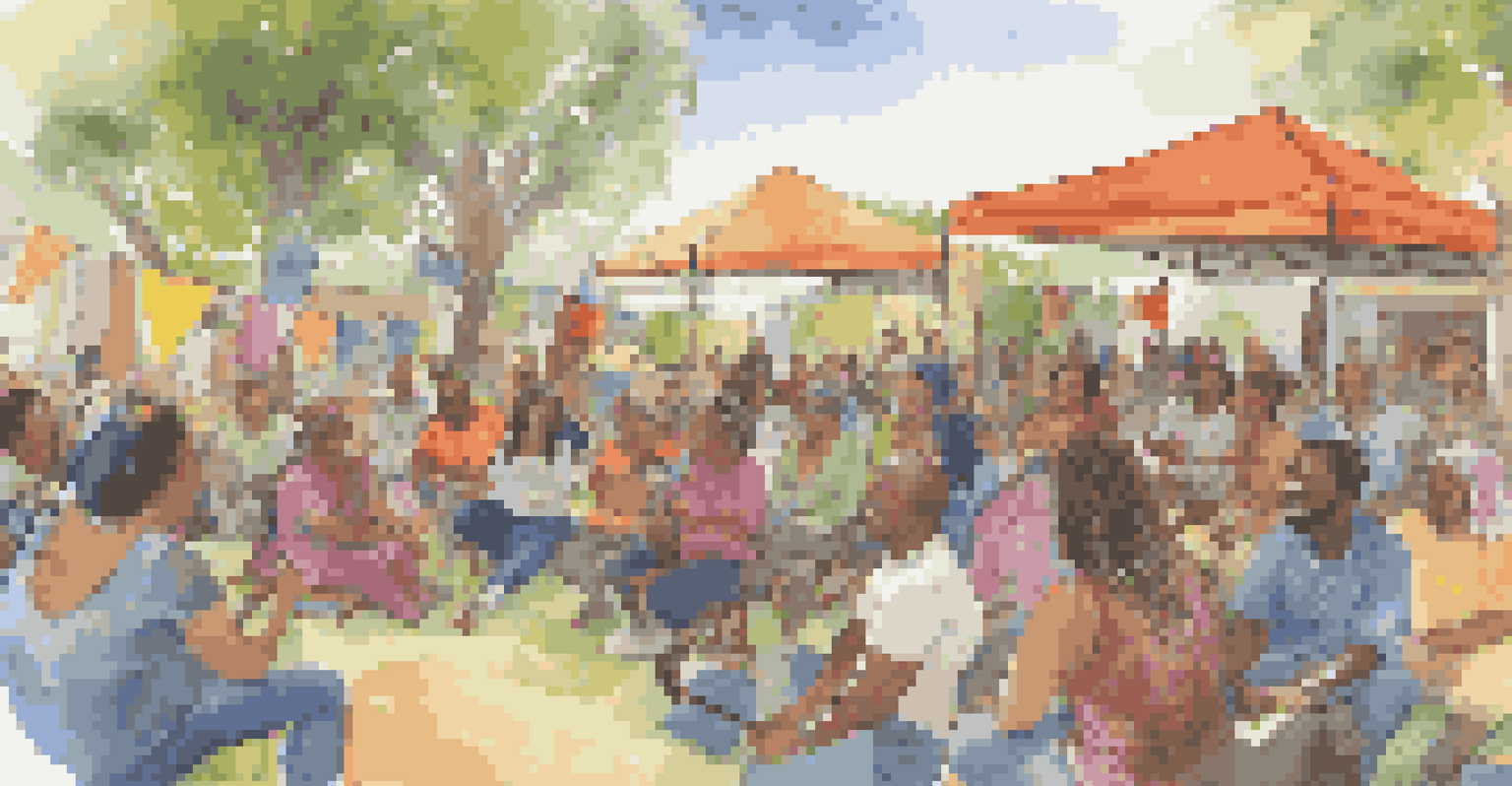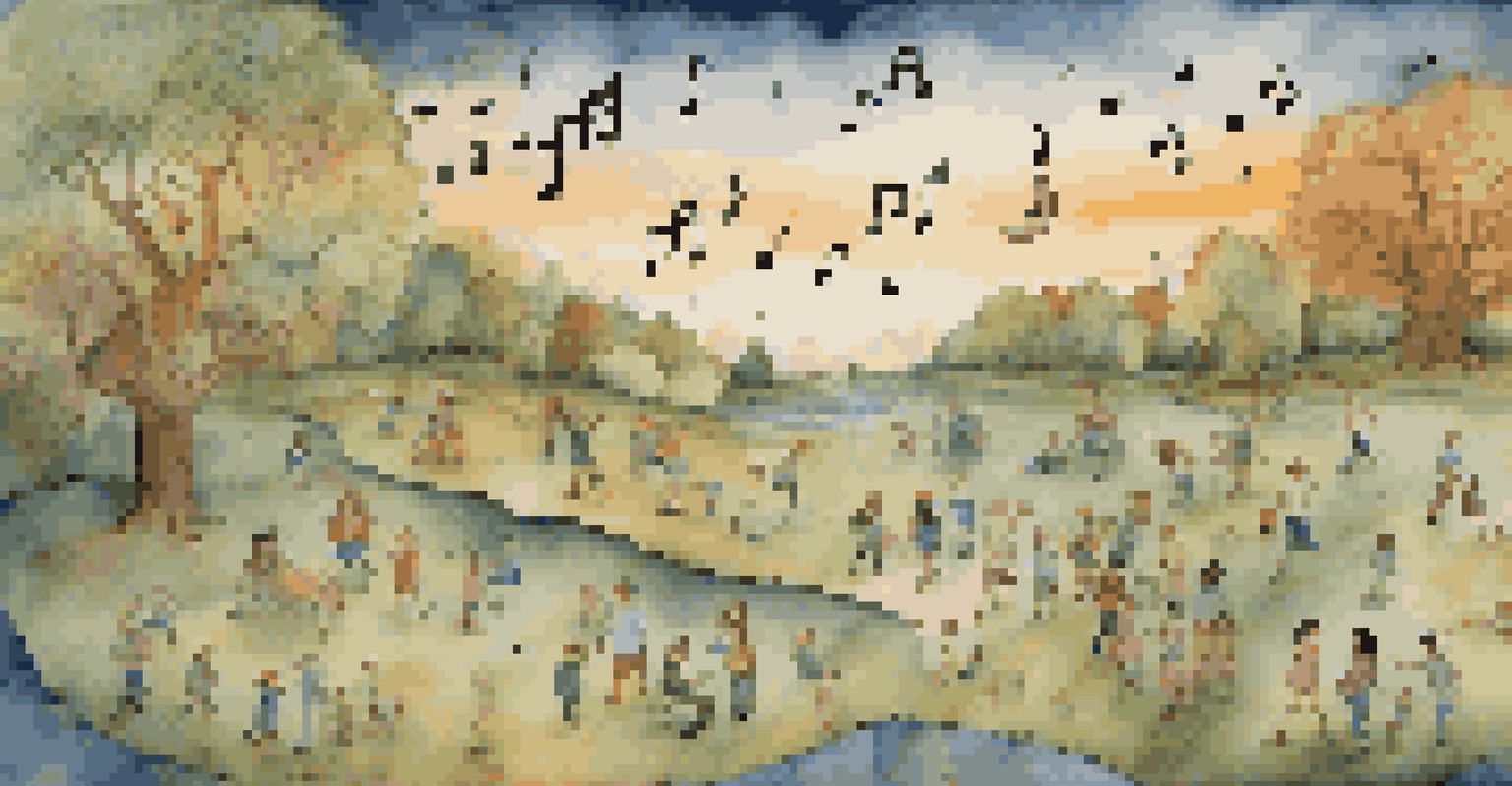The Role of Music in Memory Retrieval for Oral Histories

Understanding Oral Histories and Their Importance
Oral histories are personal narratives that capture individual experiences, often passed down through generations. They serve as a rich resource for understanding cultural and historical contexts. By sharing stories through spoken word, these narratives preserve memories that might otherwise fade away.
Music can change the world because it can change people.
The significance of oral histories lies in their ability to humanize historical events, allowing individuals to connect emotionally with the past. They provide insights not just into facts, but also into feelings, values, and perspectives that shape our understanding of history.
As we delve into the role of music in memory retrieval, it’s essential to recognize how oral histories breathe life into memories, creating a tapestry of shared experiences that resonate across time.
The Science Behind Music and Memory
Research has shown that music can evoke vivid memories and emotions, making it a powerful tool for memory retrieval. When we hear a familiar tune, it often triggers recollections of significant events tied to that music. This phenomenon occurs because music activates various areas of the brain associated with memory and emotions.

For example, a specific song might remind someone of their childhood or a nostalgic moment with friends. This connection highlights how music can serve as a mental anchor, bringing past experiences to the forefront of our minds.
Oral Histories Preserve Memories
Oral histories capture personal narratives that connect individuals to their cultural and historical contexts.
Understanding this relationship offers valuable insights into how we can use music effectively in oral histories, enriching the storytelling process and enhancing the emotional depth of the narratives shared.
Music as a Memory Cue in Oral Histories
Music functions as a cue that helps individuals recall specific details and stories during oral history interviews. When an interviewee hears a song from their past, it can spark memories they might not have accessed otherwise. This ability to trigger recollections can lead to more engaging and detailed narratives.
The stories we tell are the stories we live. They are our collective memory.
For instance, an elderly person reminiscing about their youth may find that a song from that era helps them articulate stories about their first love or significant life events. These moments create a more vibrant and authentic portrayal of their experiences.
Incorporating music in oral history projects not only aids memory retrieval but also enriches the overall storytelling experience, making it more relatable and impactful for listeners.
Creating Playlists for Oral History Projects
When embarking on an oral history project, creating a playlist of relevant songs can be an effective strategy. This playlist can include tracks that hold personal significance for the interviewee or songs from the time period being discussed. By curating these musical selections, you set the stage for deeper conversations.
During the interview, playing these songs can help evoke memories and stories that might not surface in a standard conversation. This approach allows the storyteller to connect emotionally with their past, leading to richer and more nuanced narratives.
Music Enhances Memory Retrieval
Music serves as a powerful cue that evokes vivid memories, enriching the storytelling in oral histories.
Moreover, using music in this way can foster a sense of comfort and familiarity, making the interviewee feel more at ease as they share their experiences.
The Emotional Connection of Music in Storytelling
Music has a unique ability to evoke emotions; it can amplify the feelings associated with a story. When shared in conjunction with oral histories, music can heighten the emotional impact of the narrative, allowing listeners to connect on a deeper level. This emotional resonance is what makes storytelling so powerful.
For example, a heartwarming story about a family gathering can be made even more poignant with the right background track. The music enhances the mood, drawing the audience into the moment and allowing them to feel the emotions being conveyed.
This emotional connection is crucial in oral histories, as it transforms simple stories into profound experiences that linger in the minds of the audience.
Case Studies: Music and Memory in Oral History
Several case studies highlight the effective use of music in oral history projects. For instance, a project where veterans shared their experiences often included songs from their time in service, leading to poignant recollections about camaraderie and sacrifice. These musical cues not only facilitated memory retrieval but also created a shared experience for the audience.
Another example can be found in community storytelling events where local music is interwoven with personal narratives. This blend of music and storytelling fosters a sense of belonging and cultural identity among participants, reinforcing community ties.
Emotional Impact of Music in Stories
Incorporating music into oral histories amplifies emotional connections, making narratives more impactful for listeners.
These case studies illustrate the impact of music as a memory aid and its potential to create meaningful connections within oral histories.
Challenges and Considerations in Using Music
While music can greatly enhance oral histories, there are challenges to consider. Not every song may resonate with every individual; personal associations with music can vary widely. It’s important to be sensitive to the interviewee's preferences and experiences to avoid triggering negative memories.
Additionally, the context of the music matters. A song that evokes joy for one person might remind another of a difficult time. Understanding these nuances can help ensure that music serves as a positive tool in the storytelling process.

By being mindful of these challenges, we can effectively harness the power of music to enrich oral histories without causing discomfort.
Conclusion: The Lasting Impact of Music on Oral Histories
In conclusion, music plays a vital role in enhancing memory retrieval in oral histories. Its ability to evoke emotions and trigger vivid memories makes it an invaluable tool for storytellers. By thoughtfully incorporating music into oral history projects, we can create a richer, more engaging experience for both the storyteller and the audience.
As we continue to explore the intersection of music and memory, it’s clear that the narratives we share are not only preserved in words but also enriched through the melodies that accompany them. This fusion of music and storytelling helps keep our collective memories alive.
Ultimately, recognizing the impact of music in oral histories opens up new avenues for preserving our past, fostering connections, and creating a deeper understanding of the diverse experiences that shape our world.